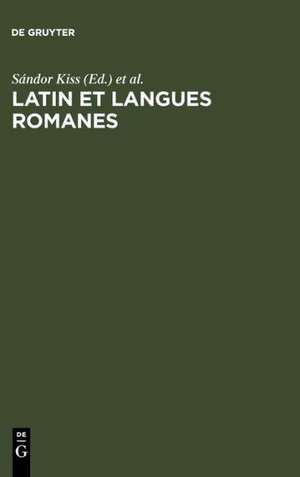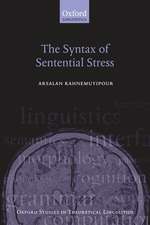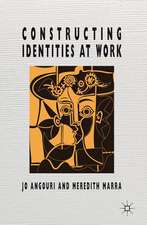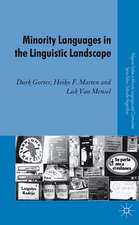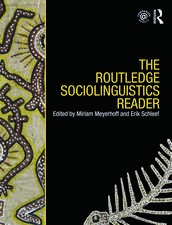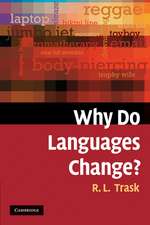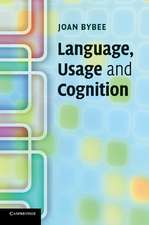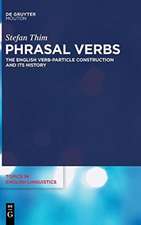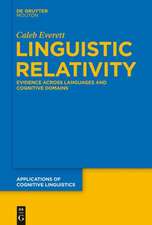Latin et langues romanes: Études de linguistique offertes à József Herman à l'occasion de son 80ème anniversaire
Editat de Sándor Kiss, Luca Mondin, Giampaolo Salvifr Limba Franceză Hardback – 31 dec 2004
Preț: 1531.80 lei
Preț vechi: 1868.06 lei
-18% Nou
Puncte Express: 2298
Preț estimativ în valută:
293.11€ • 306.66$ • 243.49£
293.11€ • 306.66$ • 243.49£
Carte disponibilă
Livrare economică 13-27 martie
Preluare comenzi: 021 569.72.76
Specificații
ISBN-13: 9783484505087
ISBN-10: 3484505087
Pagini: 626
Ilustrații: Num. figs.
Dimensiuni: 155 x 230 x 39 mm
Greutate: 1.04 kg
Ediția:Reprint 2011
Editura: De Gruyter
Colecția De Gruyter
Locul publicării:Berlin/Boston
ISBN-10: 3484505087
Pagini: 626
Ilustrații: Num. figs.
Dimensiuni: 155 x 230 x 39 mm
Greutate: 1.04 kg
Ediția:Reprint 2011
Editura: De Gruyter
Colecția De Gruyter
Locul publicării:Berlin/Boston
Cuprins
Table des matières: Bibliographie des travaux de József Herman. - Théorie et histoire de la linguistique: Lorenzo Renzi, Tecniche della linguistica storica: Gli etimologi francesi e le 'quattuor species'. - Roman Müller, Antike Periodisierungsmodelle des Lateinischen. - Indo-européen et latin classique: Philip Baldi/Pierluigi Cuzzolin, Considerazioni etimologiche, areali e tipologiche dei verbi di 'avere' nelle lingue indoeuropee. - Christian Lehmann, Sur l'évolution du pronom possessif. - Oswald Panagl, Archaisierende Tendenzen in der lateinischen Sprachgeschichte. - Harm Pinkster, The use of is and ille in Seneca Rhetor. - Anna Orlandini, Polysémie et modalités de l'expression périphrastique avec l'adjectif verbal en -urus en latin. - Christian Touratier, Esquisse de l'histoire de la complétive en quod. - Anna Marinetti/Aldo L. Prosdocimi, Le dediche del lucus pesarese CIL I2 378, 379: Appunti di lettura. - Luca Mondin, Ausonio e il testo di Sallustio. - Latin vulgaire et tardif: Michel Banniard, Prérequis de réceptibilité du latin tardif en période de transition. - Alberto Varvaro, La latinizzazione delle province come processo di lunga durata. - Marco Mancini, La formazione del 'neostandard' tardolatino: il caso delle differentiae uerborum. - Louis Callebat, Expressivité familière et création littéraire. - Gerd Haverling, Sur les fonctions de l'imparfait dans le latin tardif. - Michela Cennamo, Passive auxiliaries in Late Latin. - J.N. Adams, The accusative + infinitive and dependent quod-/quia-clauses: The evidence of non-literary Latin and Petronius. - Benjamín García-Hernández, Recomposición verbal y homonimia en latín vulgar. - Sándor Kiss, Évolution des possibilités présentationnelles en syntaxe latine. - Hannah Rosén, Particles. Hypercharacterization and status shift in Latin and Romance. - Johannes Kramer, Graecitas togata: coemeterium. - C. Arias Abellán, Notas sobre el léxico de los »Carmina Latina Epigraphica«. - Pierre Flobert, Le latin des ostraca du »Mons Claudianus«. - Béla Adamik, >Fehlerhafte< lateinische Inschriften aus Pannonien. - Alberto Zamboni, Dalmatica quaedam: note in margine ad una silloge recente. - Heikki Solin, Munitus. - Thorsten Fögen, The role of verbal and non-verbal communication in ancient medical discourse. - Frédérique Biville, Une langue sous influences: Le latin des traités tardifs adaptés du grec: L'exemple du »De Medicina« de Cassius Felix. - D.R. Langslow, Linguistic >highs< and >lows< in late Latin medical texts: L. utique and the dangers of generalizing. - Claude Moussy, Nouveaux préverbés en com- dans la Vetus Latina et dans la Vulgate. - Michèle Fruyt, La corrélation et la proposition relative dans l'»Itinerarium« d'Egérie. - Juan Gil, Sobre la »Expositio totius mundi et gentium«. - Paolo Mastandrea, Vicende di testi fra tarda antichità e alto medioevo: Colombano lettore di Rutilio. - Marc Van Uytfanghe, Quelques observations sur la langue de la Vie de saint Eucher, évêque d'Orléans (VIIIe siècle). - Piera Molinelli, Livelli di lingua e di cultura nel »Chronicon« di Andrea di Bergamo (IX secolo). - Bengt Löfstedt, Sprachliches und Stilistisches zu Juan Mariana. - Langues romanes: Günter Holtus/Anja Overbeck/Harald Völker, Ergebnisse des Trierer Urkundensprachenprojektes. - Alberto Nocentini, Du latin aux langues romanes: La contribution de la typologie. - Michele Loporcaro, La sillabazione di muta cum liquida dal latino al romanzo. - Martin Maiden, La ridistribuzione paradigmatica degli 'aumenti' verbali nelle lingue romanze. - Nunzio La Fauci, Il fattore HABEO: Prolegomeni a una nuova considerazione delle genesi del perfetto e del futuro romanzi. - Giampaolo Salvi, Coordinazioni asimmetriche nelle lingue romanze antiche. - Roger Wright, Romance and Ibero-Romance in the »Descort« of Raimbaut de Vaqueiras. - Gerold Hilty, La herencia visigótica en el léxico de la Península Ibérica. - José A. Correa, Aféresis en topónimos latinos hispánicos. - Antoni M. Badia I Margarit, Entorn del concepte de >romanització<: A propòsit dels orígens de la llengua catalana. - Jakob Wüest, Linguistique historique et linguistique de la langue. - Brigitte L.M. Bauer, Innovation in Old French syntax and its Latin origins. - Jean Perrot, Existe-t-il en français une marque préfixée z- de pluriel? - Rosanna Sornicola, Sintassi e stilistica dei pronomi soggetto nel »Saint Alexis«. - Leena Löfstedt, Observations sur la toponymie dans la traduction en ancien français du »Decretum Gratiani«. - Ricarda Liver, Zur Wortgeschichte von bündnerromanisch tedlar >hören, horchen<. - Laura Vanelli, Avverbi di luogo (deittici e anaforici) in italiano antico. - Paola Benincà, Pronomi e complementatori: Sulle grafie che, ke, que nelle antiche varietà italiane settentrionali. - Max Pfister, La contribution de la lexicologie italienne au lexique non attesté du latin vulgaire. - Maria Iliescu, Considérations sur l'évolution sémantique du lat. mergere.
